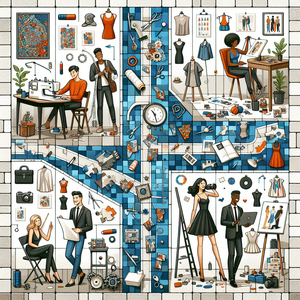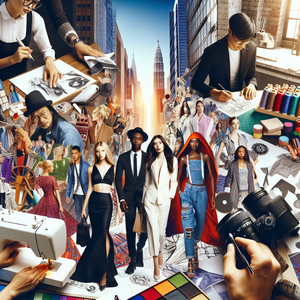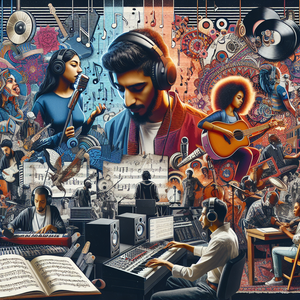
Exploring 15 Exciting Careers in Fashion: Roles, Responsibilities, and Insights
The fashion industry is a vibrant and ever-evolving domain that merges creativity, commerce, and technology. With myriad career paths available, individuals can find roles that resonate with their artistic inclinations, business acumen, or technical expertise. As consumer tastes shift and technology advances, professionals in this field must remain agile and well-versed in both traditional and contemporary practices. This article delves into 15 prominent job titles within the fashion world, outlining their core responsibilities, qualifications, and significance while highlighting industry trends, salary expectations, and growth opportunities.
Job Summaries:
Fashion Designer:
- Fashion Designers are the visionaries behind captivating clothing, accessories, and footwear.
- They immerse themselves in trend research, sketch their ideas, select materials, and oversee production, ensuring their artistic vision is realized.
- Typically, a bachelor’s degree in fashion design or a related field is necessary, alongside strong skills in sewing and pattern-making.
- As trendsetters, these designers significantly influence consumer behavior and the industry's trajectory.
Creative Director:
- One shapes the visual and creative direction of a brand or collection.
- This leadership position involves guiding a team of designers.
- Collaborating closely with marketing and sales teams to maintain a unified brand image.
- Exceptional communication skills are essential.
- A robust background in fashion design is essential.
- The Creative Director’s vision is vital for establishing a brand’s market presence.
Fashion Buyer:
- Fashion Buyers are essential in curating and purchasing apparel and accessories for retail environments.
- They must possess a keen understanding of market dynamics, consumer behavior, and inventory management.
- By analyzing sales data, Buyers make strategic decisions to align with their store's brand identity.
- A degree in business, marketing, or fashion merchandising is often advantageous.
- Their choices directly affect product availability and consumer satisfaction.
Fashion Merchandiser:
- Fashion Merchandisers craft strategies to promote and sell fashion items while responding to consumer demand.
- Their duties often include analyzing market trends, developing visual displays, and coordinating promotional events.
- A background in fashion merchandising or marketing is beneficial, complemented by strong analytical and creative abilities.
- Merchandisers play a crucial role in enhancing brand visibility and driving sales.
Technical Designer:
- Technical Designers are key players in the garment production process, ensuring designs can be manufactured effectively.
- They create detailed specifications, conduct fittings, and collaborate with manufacturers to uphold quality standards.
- A background in fashion design or textile engineering is typically required, along with adept problem-solving skills.
- Their expertise ensures that creative visions are accurately translated into final garments.
Fashion Stylist:
- Fashion Stylists curate outfits and looks for clients, photoshoots, or events.
- Requires a deep understanding of fashion trends and the ability to adapt to diverse aesthetics.
- Strong interpersonal skills are crucial.
- Stylists often work with models, photographers, and designers.
- Formal education is not always essential, but experience in the fashion realm can be beneficial.
- Stylists are integral in crafting visual narratives within the fashion landscape.
Fashion Illustrator:
- Fashion Illustrators produce visual representations of clothing and fashion concepts.
- Utilizing both traditional and digital art techniques.
- This role demands artistic talent and a good grasp of fashion design trends.
- A degree in fine arts or fashion design can be advantageous.
- Illustrators are vital in communicating design ideas before they reach production.
Textile Designer:
- Textile Designers focus on creating and developing fabrics and patterns for fashion items.
- Their work involves trend research, material experimentation, and collaboration with fashion designers to ensure textiles complement collections.
- A degree in textile design or fashion is usually necessary, along with a blend of creativity and technical know-how.
- Their contributions are essential in enhancing the overall aesthetic appeal of fashion products.
Fashion Marketing Manager:
- Fashion Marketing Managers devise and execute marketing strategies to effectively promote brands and products.
- This role requires strong analytical and communication skills and a background in marketing or business.
- Responsibilities include campaign management, market data analysis, and coordination with sales teams.
- These professionals play a critical role in connecting brands with consumers and driving growth.
Fashion Public Relations Specialist:
- Fashion PR Specialists manage the public image of fashion brands through media relations, press releases, and event planning.
- Excellent communication skills and a solid understanding of the fashion landscape are essential.
- A degree in public relations, communications, or marketing is often preferred.
- By shaping a brand's narrative, PR Specialists are vital in maintaining brand visibility and reputation.
Fashion Retail Manager:
- Fashion Retail Managers oversee daily retail store operations.
- Ensuring sales targets are met and customers receive exceptional service.
- Responsibilities include staff management, inventory control, and optimizing visual merchandising.
- A background in retail management or business is typically required.
- Strong leadership capabilities are important.
- Retail Managers play a crucial role in creating positive shopping experiences that drive sales.
Fashion Event Coordinator:
- Fashion Event Coordinators are responsible for planning and executing fashion shows, product launches, and promotional events.
- This role demands exceptional organizational skills and the ability to manage multiple tasks simultaneously.
- A degree in event management, hospitality, or a related field can enhance career prospects.
- Coordinators are essential in creating memorable experiences that engage consumers and promote brands.
Fashion Product Developer:
- Product Developers work alongside designers and manufacturers to bring new products to market.
- Their role involves trend research, material sourcing, and overseeing production timelines.
- A background in fashion design or business is often preferred, along with strong project management skills.
- Product Developers ensure that new collections meet market demands and are delivered on schedule.
Fashion Photographer:
- Fashion Photographers capture compelling images of apparel and accessories for editorial, advertising, and promotional use.
- This role requires a strong portfolio, artistic vision, and technical expertise in photography and lighting.
- While formal education isn’t always necessary, experience in fashion photography is advantageous.
- Photographers significantly influence consumer perceptions of fashion products.
Fashion Research Analyst:
- Fashion Research Analysts conduct market research to identify trends and consumer preferences within the fashion sector.
- Strong analytical skills and the ability to interpret data effectively are crucial.
- A degree in marketing, business, or a related field is often preferred.
- Analysts provide valuable insights that inform design and marketing strategies.
In conclusion, the fashion industry is filled with diverse career paths that cater to a broad spectrum of interests and skills. By examining these roles, aspiring professionals can uncover opportunities that align with their passions and expertise, setting the stage for a rewarding career in this vibrant field. As the fashion landscape continues to evolve, staying updated on industry trends, job prospects, and in-demand skills will be crucial for anyone looking to make an impact.
Explore More Jobs

